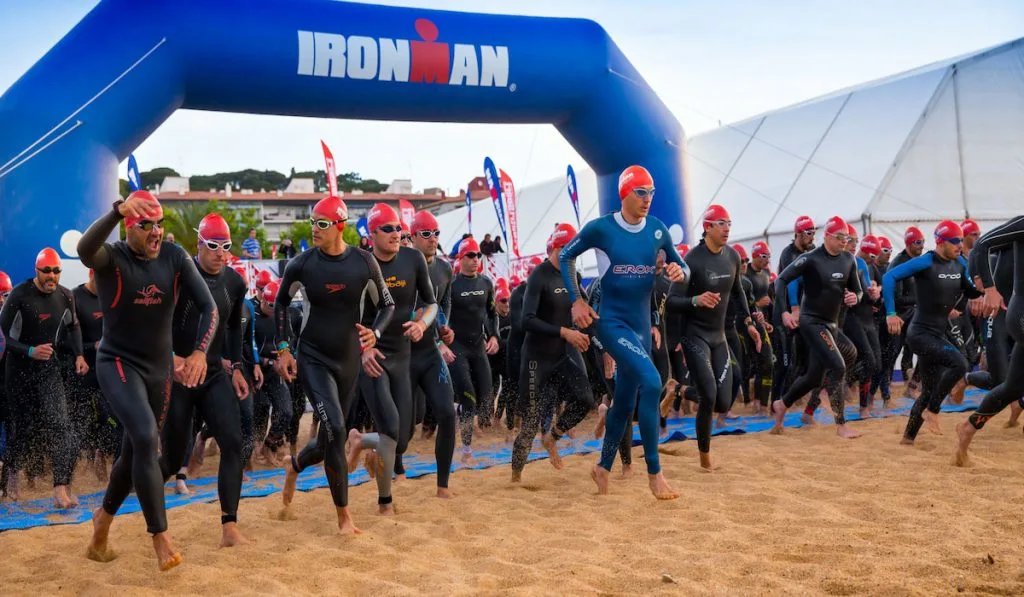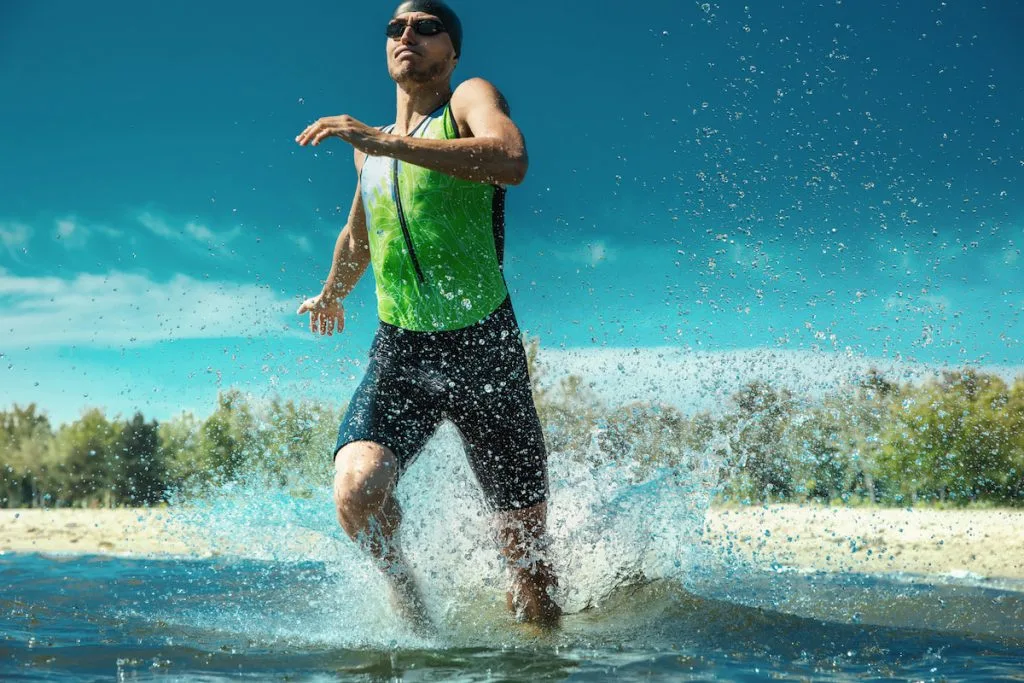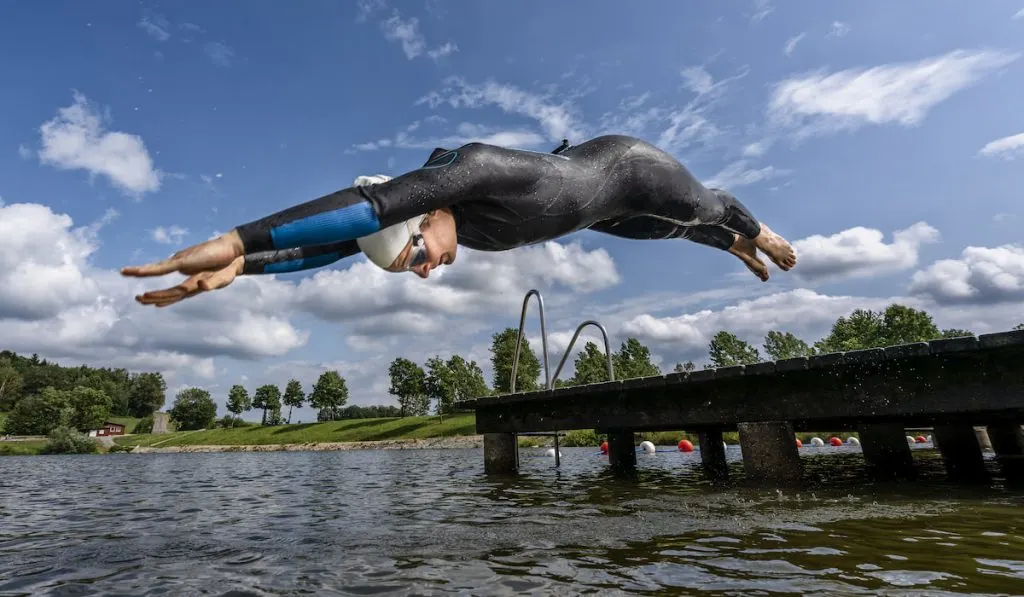After going through intensive swimming, biking, and running training sessions, you’ll want your Ironman race day to go smoothly. But the thing is, a lot can happen on that day; anything is possible.
Even so, you can raise the chances of the events going your way if you do the right things.
Not sure of the right things to do on your Ironman race day? We’ve got you. In this article, we offer 12 Ironman race day tips you should know.
Ironman Race Day Tips

Get To the Start Line Relaxed
You may be tempted to do some intense warmups on race day; you may also be tempted to try to rev up your fitness in the days before the race. Our advice is don’t do any of these.
You should get to the start line fresh and relaxed. Doing intense warmups on race day or having training sessions a few days before the race will hurt your freshness. Obviously, if you are not fresh for the race, you will not perform to the best of your abilities.
Besides avoiding intense warmups on race day and training sessions close to race day, try not to wander around the area. You may think that simply walking around will not affect your freshness. But if the environment is fascinating, you may just spend more time exploring than you had planned. Of course, this can affect your freshness.
While you may have trouble sleeping on the night before the race, ensure you sleep well on the nights 2-3 days before the race.
Wear the Most Convenient Kit
Your kit is very vital to how your feel while racing. It goes without saying, but if you are not comfortable in what you wear, you will not perform optimally.
When choosing your kit, opt for materials that do not irritate your skin. Also, ensure you can wear your kits in transition without fuss.
Consider toilet breaks when choosing your kits too. During the race, you may want to relieve yourself, but time will not stop for you. So, your toilet breaks must be swift. Ensure your kits are toilet-break-friendly.
Remember, Ironman triathlons extend for a large part of the day. So, all in all, you want to ensure you opt for the most comfortable kit you can get.
Do Not Let Your Mind Wander

There is a chance that while racing, you may lose focus while your mind wanders. Do not let this happen.
While racing, pay attention to yourself: your cadence, heart rate, your effort, and the execution of your plan. Paying attention to these details about yourself during the race can help get you into a rhythm.
Even if your mind does wander, ensure it’s all minimal and that you think only positive thoughts. But if negative thoughts creep into your mind, try to get them out as fast as you can.
Repeating a positive mantra or song can help with this. You can also focus on the environment or counting to push the negative thoughts out.
Go Over Your Plan for the Race
Before the race day, ensure you come up with a comprehensive race plan. Your race plan should include your pacing plan, nutrition plan, transition plan, and what-if plan.
Before you start the race, ensure you go over your plans.
When going over your pacing plan, ensure your goals are definite and possible. Try to stay within the range of the power zones and heart rate you set for yourself. Remember, the competition is more about endurance than speed.
Your nutrition plan should feature all you intend to eat and drink during the race. It should also include your pre-race nutrition.
While going over your nutrition plan, do not add anything new. You should perfect your strategy before race day.
Your what-if plan should contain various contingencies. Go over what you intend to do if any setback pops up. One upside of the what-if plan is that it strengthens your mind since you will feel better prepared for almost anything.
While going through your transition plan, map out all the exits in your mind. This way, you will not go the wrong way and lose valuable seconds during the race.
Reviewing the plans gives you a clearer picture of how you intend to navigate the events.
Give Yourself Enough Time to Get Things Ready on Race Day
On the morning of the race, ensure you give yourself enough time to sort your nutrition, bike, and other essential items out.
If you give yourself sufficient time, you can fix any potential issue with the bike and take some time for a light warmup.
Divide Your Race
Rather than seeing your race as one big task, try diving it into smaller sections mentally.
Split the swimming, biking, and running tasks into smaller sections in your mind. By doing this, the whole Ironman triathlon can feel less daunting to you. Dividing the race also helps you with a sense of achievement for each one of the smaller sections you complete.
Furthermore, splitting your race can be of tactical advantage. You can tailor a plan for each smaller section of the race you create in your mind.
Try to Find a Spacious Area While Swimming

During the swimming task, there can be a lot of people in the water at the same time. And each swimmer can be an obstruction to the other. The more barriers you have in your path, the more energy you will expel trying to avoid them.
Remember, the Ironman triathlon is an endurance sport. So, you want to ensure you conserve your energy as much as possible. So do your best to find some space. Of course, doing this might not be easy, but it is the best way to go if you want to conserve your energy.
Be Calm
On race day, there will be many athletes from different backgrounds. As you can expect, some of them might not be so pleasant.
No matter what happens, try to stay calm. Keep your emotions in check – be almost robotic. Do not let anger or irritation throw you off your game plan. It is race day, and you may already be tense. Getting riled up will make things worse.
Keep Your Fuel Reachable
When on your bike, ensure your hydration and nutrition can be accessed readily. Having your fuel in places you cannot reach with ease can cause you to lose concentration.
Besides keeping your fuel reachable, ensure you can unpack or unwrap it. Your food bars and gel packets should be easy to unfurl from their wrappers.
Keep your fuel secure too, you do not want it flying off when your bike hits a bump.
Monitor Your Water Input and Output
While racing, you must ensure that your water input and output are approximately equal. If you consume too much water or too little, your hydration may suffer. Of course, if you are not well hydrated, you will not perform as you should.
Generally, on hot days, you will need more water because you will sweat more. But rather than just going by that, take note of your optimal water intake and output during training.
Gather data on how much you drink and the corresponding sweating rate. From the data you have, you can figure out how much water to drink while you race.
Walk if You Have To

During the running task, if you feel that you cannot run all the way, walk. Do not push yourself too hard, or you may end up wearing yourself out before the race ends.
If you have to walk during the running task, alternate running with walking. Run some distance, then walk some distance to recover, then run again. Keep repeating the cycle as you deem fit for yourself.
The good thing about alternating running with walking is that you can recover mid-race. Walking also gives you a chance to enjoy the race.
Keep Going
Ironman triathlon is no walk in the park by any means. But you are in the competition for the challenge, and you should see it through.
There is a good chance that you will have some rough moments during the race. When this happens, review the situation. Then, turn to your plans and adopt the solutions you’ve set into place.
Keep going and keep a positive mentality. Remember, your race is not over until you decide to stop. So, keep going until you reach the finish line.
